A brief history of radical & racist Portland
(Published August 4, 2020 in www.blueoregon.com)
Lawrence J. Maushard a journalist and author who lived in Portland, Oregon for 17 years until 2017 before relocating back to Peoria, Illinois where he was born and raised. Read more of his work at Maushard.com.
My late wife Fay Maushard and I lived in Portland from 1999 until she passed in 2017 from heart failure and other complications from Scleroderma, a rare autoimmune disease. A proud feminist native of Iran, Fay lived a brave existence dealing with a too-often racist Portland which made it a daily battle just to interact with mainstream natives that would never let a naturalized Middle Eastern woman with an accent forget her otherness.
White women especially would weaponize the phrase “I don’t understand you!” with hateful vindictiveness. Nevertheless, we found some solace during our years there among wonderful neighbors in the Holgate-Foster neighborhood, along with the Scleroderma patient support, Persian diaspora, and international human rights communities. Fay truly loved everyone, and anyone who knew her felt the same.
So I don’t have any romanticized views of the Rose City, just a heightened understanding of its place in the world. Once you get past its history as a terrible hotbed of exclusionary racism against Chinese and Japanese immigrants, a northern outpost for the Ku Klux Klan, open segregation against its tiny black population, and enthusiastic support for its very own WWII concentration camp roundups and ethnic cleansing of the entire Japanese population in 1942, Portland somehow finally began to grow up.
Portland’s place as America’s greatest antifa city was confirmed long before the nationwide BLM rallies and marches scorched the national conscious in the wake of the May 25 police torture-murder of George Floyd in broad daylight on the streets of Minneapolis. Well before President Trump sent in terrifying anonymous federal agents that have snatched protesters off the streets into unmarked vehicles like Central American death squads coordinated by US forces in the 1980s.
Portland was a focal point of the early twentieth-century militant labor and free speech movement inspired by the legendary Wobblies, Industrial Workers of the World. That volatile working-class stridency gave us the likes of Portland journalist and activist author John Reed whose landmark book 10 Days That Shook The World was his first-hand account of the 1917 Bolshevik October Revolution in Russia that included a foreword by Lenin himself.
In the depths of the Depression, Portland dockworkers famously battled with police and Chamber of Commerce controlled thugs in 1934 for the right to unionize under the banner of the International Longshore & Warehouse Union. Mayhem, gunplay and several deaths occurred. It was “the most devastating work stoppage in Oregon’s history, which lasted 82 days, paralyzed commerce, and laid off 50,000 Oregonians,” wrote local historian Michael Munk.
In 1967 the Rose City was rocked by several days of violent black uprisings during the Albina Riots after a lifetime of white racist oppression in a state that included prohibitions for black property ownership and living in the Beaver State written into the state charter and not removed until the 1920s. At that time, the Ku Klux Klan held mainstream open memberships among the police force, utility companies, banking institutions and religious congregations. Portland’s mayor was assumed to be a member or sympathetic as well as state representatives, the leader of the state legislature, and the governor.
At the height of Vietnam War tensions in May 1970, city police shockingly attacked encamped and defenseless Portland State University students in the South Park Blocks with dozens of baton strikes to clear the area. Thousands marched on City Hall the next day with a list of demands with some injured student leaders still wearing bandages. That November, a huge dynamite bomb was detonated in the lower level of City Hall directly below council chambers about 3am Saturday Nov. 21. An estimated $1 million damage in today’s money was caused with windows blown out three blocks away. No one was injured in the massive blast, and no one has ever been arrested or credibly connected with the explosion.
Portland famously was dubbed “Little Beirut” in the late ’80s and early ’90s by members of the George H.W. Bush crowd based on hostile welcomings received by the elder Bush and his VP Dan Quayle. Things really got crazy when George W. Bush dropped into Portland on August 22, 2002 for a fundraiser at the downtown Hilton for US Senator Gordon Smith. I was one of several thousand peaceful protesters who resembled more a tree-hugging family-friendly anti-war street theatre performance group than any kind of threatening black bloc tangle of agitators labeled then by The New York Times as the largest anti-Bush demonstration since the 9/11 attacks.
I was right on the front barricades facing off against PPD robocops decked out in full militarized riot gear. While the rest of the country was still sucking up to W, Portland let out a primal scream against his obvious march to invade Iraq after landing troops in Afghanistan and itching for a whole lot more. We were loud and profane, but absolutely nonviolent.
Police attacked innocent peaceful women and children and seniors and others. Tear gas, pepper spray, baton strikes, rubber bullets, flash bangs and more were unnecessarily released on us, resulting in a number of injuries, some to children. I saw police horse collar and face punch a defenseless middle-age woman. I was hit by a baton swinging cop wildly lunging out at anyone in sight. I saw cops maniacally charge protesters like out-of-control linebackers setting up haymakers and sucker punches.
The one thing I did not witness was panic. Brave everyday Portlanders rather calmly backed up step by amazing step as the police continued to charge us, like a disciplined military retreat. Peaceful civilians are expected to cut and run and trample each other in the face of unprovoked physical assaults. For whatever reason, under fire, they did not. The inevitable follow-up court case described what occurred as a “police riot,” which eventually lost the city about $900,000 in settlements and court costs.
During the early years of the Iraq invasion and occupations, tens of thousands of Portlanders regularly turned out for overwhelmingly peaceful demonstrations, making the Rose City one of the leading international centers of the anti-war and anti-imperialist movements. San Francisco, London, New York, Barcelona, Chicago, Paris and Denver had nothing on Portland.
I don’t pretend to know the particulars about the current BLM, antifascist and anti-Trump demonstrations that have rocked downtown Portland for more than two months. I left the city a few years ago after my wife died because the pain was too much. But I do know that those protesting Portlanders are acting from the very best of intentions and forcing the powers that be to act like Americans and take civil liberties and civic responsibilities seriously.
Why is Portland like this, like something most of America used to be, or thought we were? I’m not quite sure, actually, but I think it has something to do with the observation that it is the only place I ever saw that takes Presidents’ Day seriously, like a major holiday. It’s difficult to explain but lots of people and businesses take the day off, like a weird local sign of respect, something both odd and quaint in today’s America.
My dear Fay certainly was correct when she told anyone she trusted, “Portland is really racist.” Like most of America, it is. But unlike most of us who seem to have forgotten how, Portland still acts collectively to stand up in the face of injustice like no one else.
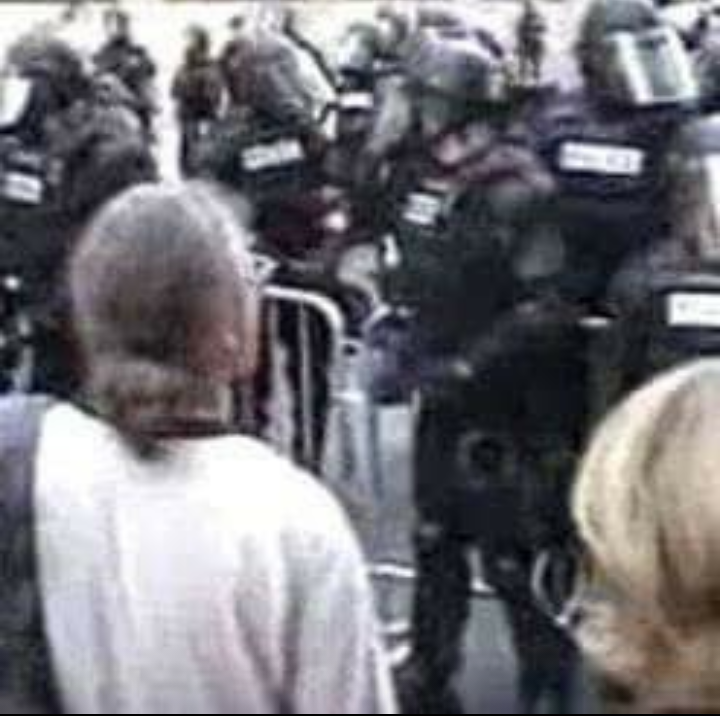 On the frontline barricade, Portland August 22, 2002.
On the frontline barricade, Portland August 22, 2002.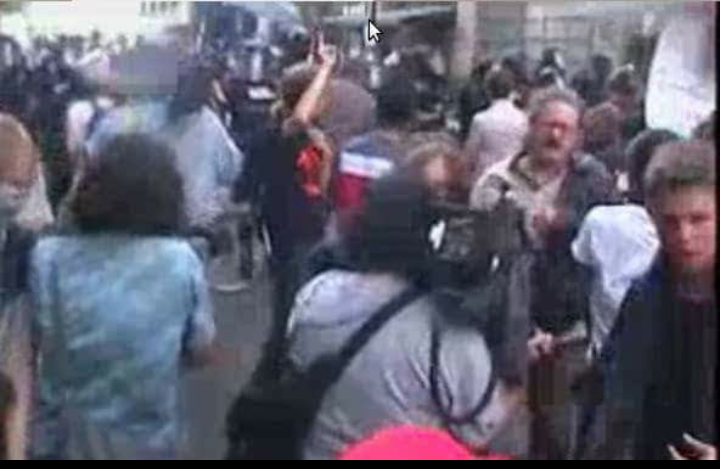 Caught in police riot assault on peaceful Portland protesters, Aug. 22, 2002. (Video stills from "a22, Portland Bush Protest" documentary by Portland Indymedia Video Collective & Riot Porn Productions).
Caught in police riot assault on peaceful Portland protesters, Aug. 22, 2002. (Video stills from "a22, Portland Bush Protest" documentary by Portland Indymedia Video Collective & Riot Porn Productions).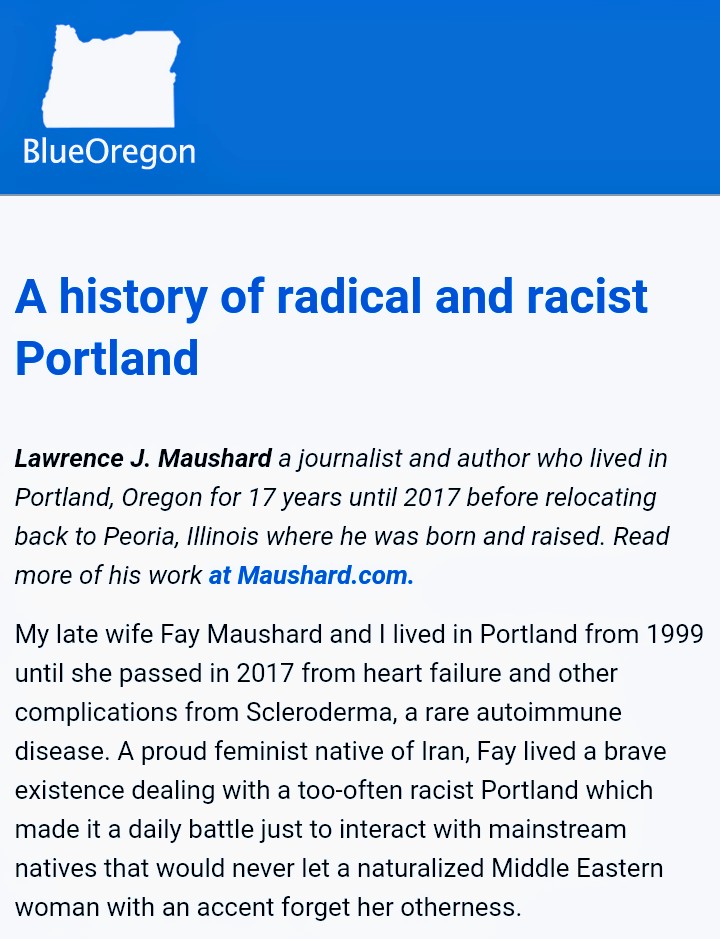
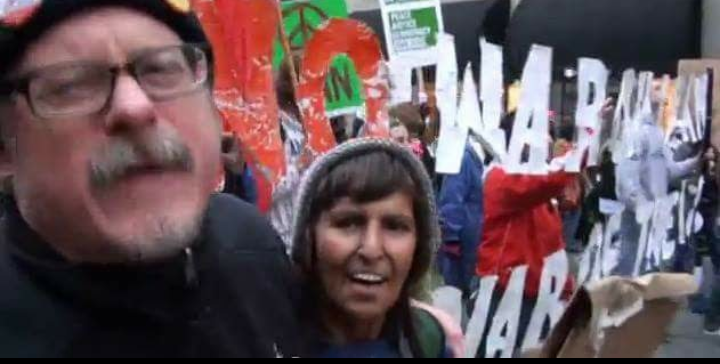 Lawrence & Fay Maushard at No War on Iran rally & march downtown Portland, 2.12.'12 (Still from joeanybody.com documentary)
Lawrence & Fay Maushard at No War on Iran rally & march downtown Portland, 2.12.'12 (Still from joeanybody.com documentary)
Latest Campaign Support
“I have known Lawrence J. Maushard since we were in high school together at Spalding Institute in the 1970’s. We have known each other for forty years and I am proud to call him my friend.
Lawrence has always been passionate and outspoken, especially when it comes to the downtrodden and less-fortunate. He has never hesitated to take to the front lines when it comes to supporting the causes he believes in.
He is intelligent and knows what he is talking about because he does the homework before coming to an opinion.
Peoria would be lucky to have someone as responsible and thoughtful as Lawrence in their city government. I encourage everyone to support his candidacy.”
STEVEN SVYMBERSKY, Brooklyn, NY. 11211
Quimby’s NYC, Brooklyn. founder & manager
Quimby Comix, Chicago. founder
Quimby Magazine, Boston. founder & editor.
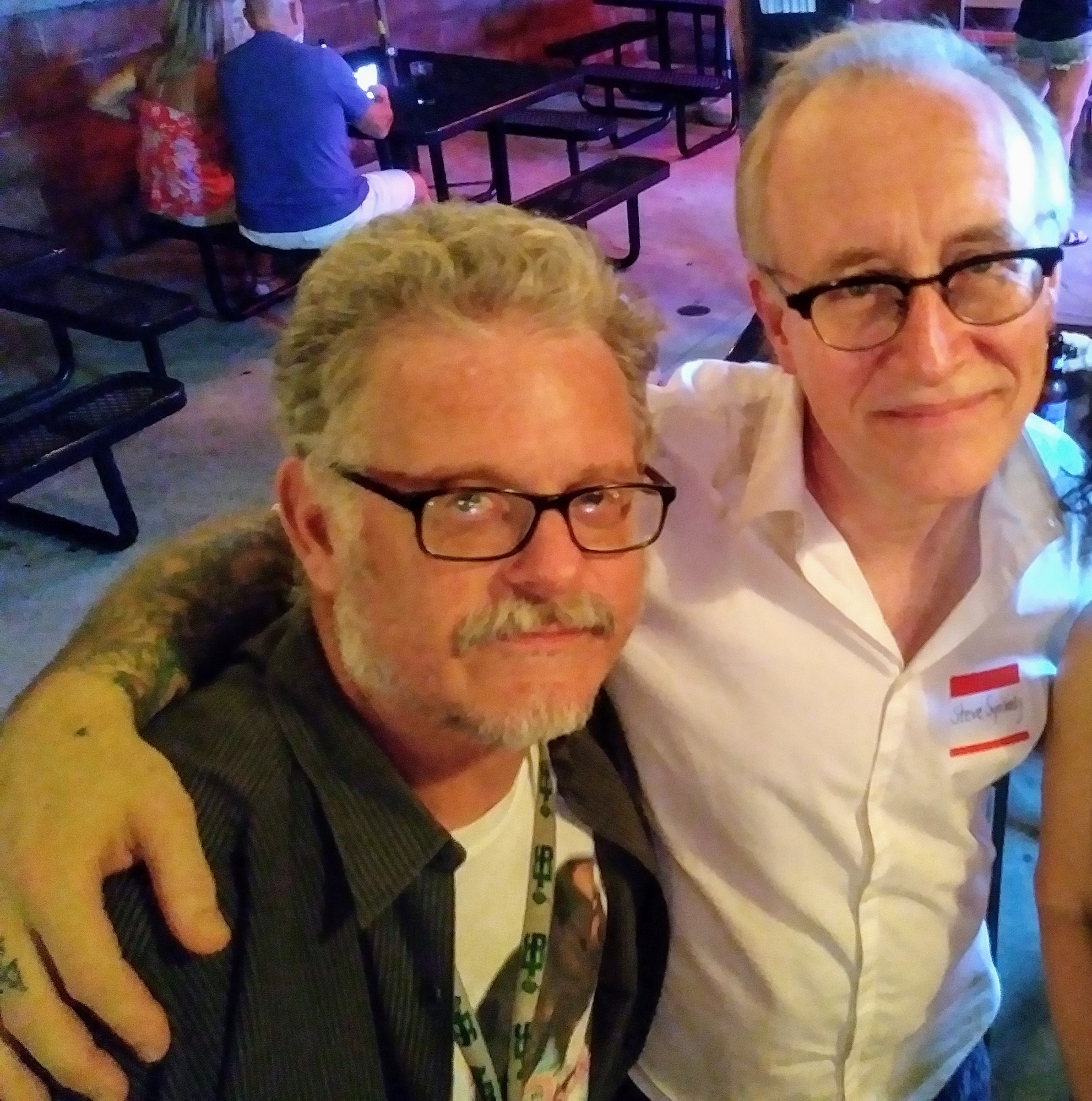 Maushard, left, & Svymbersky at '78 Academy of Our Lady/Spalding Institute 40th anniversary, August 2018 at Crusen's.
Maushard, left, & Svymbersky at '78 Academy of Our Lady/Spalding Institute 40th anniversary, August 2018 at Crusen's.
P’TROIT PRESSURE ——— NO. 1 NATIONWIDE
This is part 3, the conclusion of my interview with local musical artist and business entrepreneur Rich P Evolon, creator of “Welcome to Peoria,” a profane and profound rage on the American dream dystopia that plays all day every day right here in River City.
The main focus of my Democratic-Socialist run for Peoria city council is creating an effective voice for our working-class neighborhoods — East Bluff, South Side, North End, Center Bluff and more — left behind by the majority white population & all higher income brackets fronted by the former and current regimes now occupying city hall. Evolon has endorsed my candidacy.
After his raw take on the constant aggressions on Peoria’s African-American community, Evolon said he wanted to discuss what nobody else would:
“A big problem within our community versus other races is like we got one parent in the house, the majority of the time,” he explained at Rumberger’s Wings & More, a thriving black-owned restaurant and sports bar on Main Street in the heart of downtown.
Is that really true?
“Most definitely. If that. You might not have any parent in the house. It’s just the kids. You got the mom all day working, and you got the dad locked up somewhere, or dead.”
Grandma involved?
“If you’re lucky. Rarely you might have a grandmother. But for the most part you got mom, and she’s at work all the time. So that leaves the kid at home by themself, at a young age. For a lot of people. A lot of people. So what’s gonna happen to that kid? When he sees his momma strugglin’‘, and he’s what, 12 years old? And he sees this situation as a young boy, as a young man. He’s gonna want to help. He’s going to want to provide for his mother.”
So that means cash?
“That’s it! Anyway that he can. And the only thing that’s around him, in the immediate proximity, is drugs. Drugs and crime. So you know, that’s why the community kind of looks at that type of stuff and kinda turns a blind eye to a lot of times because we know what it’s from. We know what it’s for. He’s doing that because he’s trying to provide. Provide for his family the best way he knows how. Before he’s ever able to work. He’s twelve. Before he’s even able to get a job.”
Of course, it’s one thing to recognize a problem, and quite another to solve it. So Evolon, 29, offered this plan.
“What I would propose is that let these kids at 11, 12, when he starts getting into these ages when they thinking about providing for their family, put them into certain programs for a trade. Not job training. Trade. Welder. Barber. So they can already be set. Because the thing is , it’s not about education with them. It’s about helping my mom pay her bills. I can’t pay my bills with this diploma! I’m sorry. I got it. You want me to go to school and get straight A’s. But Mom! You’re strugglin’! We’re barely able to have a house after I got my diploma. But after I get my diploma, where are we going?! We don’t have a home.”
And you know this how?
“That is a personal thing. And it’s very common amongst our people. We need to find programs, create programs where we can put these kids into money. We need to put some money in their pockets. Because I deal with it even when I talk to the youth. They hear you. ‘That’s cool. I hear everything you sayin’. That’s cool. But I’m broke.”
So McDonald’s at $7.25 an hour isn’t enough?
“That’s not enough. At twelve you can’t even apply for McDonald’s That’s what I trying . . . “
The pressure to get money is way before the legal age to work?
“Exactly !”
Noting that this pressure exists across the nation in the African-American community, Evolon wanted to get across the need for something far better than minimum wage way too late in the game.
“Not necessarily a job. I really wanna get that clear. Like self sufficiency. If a 13 year old right now can come into (a business site) and do some welding or do some painting. After he got certified and do it himself at 13, 14. Get a couple thousand and go back home. At 13. Because that’s what we need. Nobody’s talking about that. That’s what we need.
“Next time you see a young black 12, 13 year old, think about him trying to provide for his family, his mom, as the man of the house. I’m one of them. Those 12 year olds.”
So what did you do?
“(A knowing laugh.) That’s ah . . . That’s another interview. (Again laughs at the memories.) That’s another interview. Man, you know, I’m here today. I made it out. I . . . well, I’m not gonna say I made it out because I’m still in it. But I’m not forced. I’m not forced. That’s the whole thing about it. Not bein’ forced to live a life that you’re not meant to live. You know, that’s not for you; that’s for 35, 36 year old with two, three kids. And you’re doing this at 12, 13 years old.”
There is an upside to all the too-young real world pressure, provided you survive.
“And honestly it’s a blessing, too. Because when you grow up in that environment, if you are blessed to make it out, you can really become a CEO of a company. You can really become a marketing genius based on all the knowledge of everything that you’ve been through at the bottom level. You were forced to do it.”
The feeling that Evolon and others have always understood, that Peoria is in a class by itself, is borne out in the recent annual rankings of worst US cities for black Americans as conducted by the 24/7 Wall St.com financial website, which describes itself as “Insightful Analysis and Commentary for U.S. and Global Equity Investors”. In the past four years, Peoria has been rated no. 1 (2016), no. 2 (2017), no. 5 (2018), and no. 6 (2015).
That’s worst in the nation.
For our city’s champion worst year listing, 24/7 Wallst.com stated, “The poverty rate among black residents in Peoria is more than four times the white poverty rate of 8.2%. The black unemployment rate in the metro area is 15.3% compared to 5.4% white unemployment rate. Black Peoria residents are nearly nine times more likely to be incarcerated than white residents.” In 2017, 24/7 Wall St.com noted “The difference in age-adjusted mortality rates of black and white residents in Peoria is one of the largest in the country.”
So what did you think when you heard about these surveys consistently rating Peoria at the worst, or nearly so, in the nation for black Americans?
“It makes sense to me. It makes sense. Like when I say I went to Chicago, how, you know, people from here probably look at it like, ‘Oh, man! Chicago is . . . man, you went to Chicago?!’ But in actuality, they were looking at me (in Chicago) like ‘Man, who is this guy?! Because how I approached things. It was like I must have been through something worse than what they are use to going through.”
Than Chicago?!
“Yeah. Right. Exactly.
“That was the reason I left Peoria at 17 with no plans. I just wanted to leave because I didn’t see the chains, but I felt it. I felt it. And to hear that report 10 years later, like, it made sense. I thought, man, that made sense. Like I said, I didn’t see the chains, I felt it.”
Like a change for the worse?
“Chains! Chains, yeah.
“I felt it was a ceiling here. At 17, I felt like it was a low ceiling. After a certain point, there was nothing else you could really do here, for a black man, I would say. What else is there? I’m an entrepreneur, so whatcha want me to get . . . a job? Oh, that’s the highlight of my life? Oh. Okay. All right. What is it? What is there for me? You can’t even put a poster up on the pole around here without somebody trying to take you to jail. By doing something positive. You can’t even put a party together without the police meeting you there before any one person, one body gets in the venue. Just doing it the right way. Not harming anybody. But here you are anticipating negativity, a crime. When you see police, you’re supposed to think a crime is happening. This is a party that hasn’t even happened yet.”
In my neighborhood on Arcadia in the East Bluff, cops are cruising up and down Arcadia and Wisconsin all the time. It’s like we’re under occupation. And they’re not going to a call or nothing. What is that?
“It’s bullying. It’s bullying. It’s intimidation, it’s, it’s stalking. It’s just waiting on someone to . . . You’re huntin’. You’re on the hunt. Want me to make it plain: you’re huntin’, man. While you’re doing this, I know white boys that do a lot of crime. In Peoria. If you see where they live. How nonchalant they are about what they’re doing, It’s like ‘Wow!'”
They have no fear?
“They know nothing is comin’. Nobody’s gonna ride up their block. No police is gonna be outside their clubs when they go to have a good time, to have drinks with the guys. Nobody is gonna do anything about none of that. It’s like having a parent over your shoulder every second. And you ain’t done nothing. Here’s mom. Here’s dad. Whatcha doin’?! Whatcha doin’?! It’s a hunt, man. That’s gonna influence your mind in a way. Your mind is going to force your behavior. And once you influence the behavior, they’re going to be right there. Waiting for it. So it’s like I say, they pullin’ the strings, man. The strings are invisible, so it’s hard to prove it. In court: ‘Hey, they are intimidating!’ or ‘They are stalking me!’ How can you prove that? How can you prove that they are stalking you versus them doing their job? How can you prove it? And who has the money to go to court in those neighborhoods to prove that kind of stuff? So here we are, just being intimidated.
“I won’t have it. I won’t. I got things behind me, you know? I won’t have it.”
Evolon is quick to note that the African-American community has been less successful than others at helping its own. However, the reason behind the lack of success comes from the unique form of oppression suffered by his people.
“We got work to do on both sides. The government side, how they deal with black people. At the same time we got work to do on our side. How black people deal with black people. I had a conversation at Thanksgiving with a family member. He said the reason why you see a lot of these other races sticking together and doing things economically and financially together moving as a group and a race, you know. Chinese, Arabs, Indians, Fillippinos, white people. But black people kinda struggle with that. Well, do struggle. Not kinda. At all.
“But the reason behind it, he said it was we were the only race that was actually kidnapped where we are from, brought over here and stripped of our actual family and collective unit. No other race has had that happen to them where you’re just stripped of everything. So that goes on generation to generation. Now we take an individualized mentality instead of a move to unite as a collective unit. We don’t think like that. So now we think as an individual: ‘Well, you rise. Now I gotta pull you down because I’m not going. You’re moving up, but I’m not.’ Now if we had a collective approach, we would look at it, ‘Oh, he’s going up. I’m inspired! Man! We can do something together.’ Just like every other race thinks, but we don’t think that because we’ve been trained to think like individuals.”
So that got internalized too much because people had to claw and scrape by themselves just to survive?
“Exactly what happened, down from generation to generation. ‘I’m by myself. I’m by myself. I’m by myself.’ That’s what it is.” []
See also
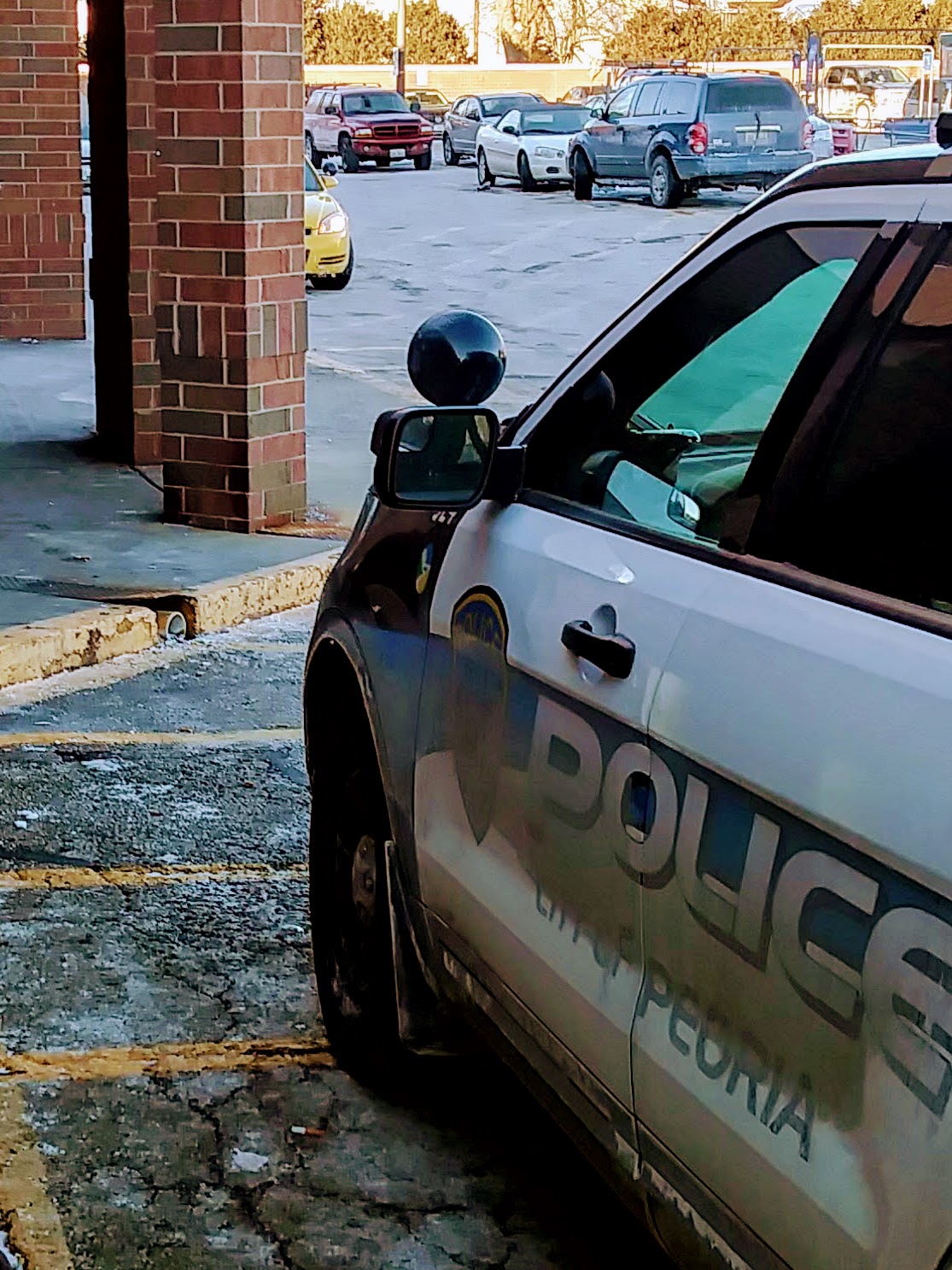 "Peoria cops are on the hunt. Want me to make it plain? You're huntin', man."
"Peoria cops are on the hunt. Want me to make it plain? You're huntin', man."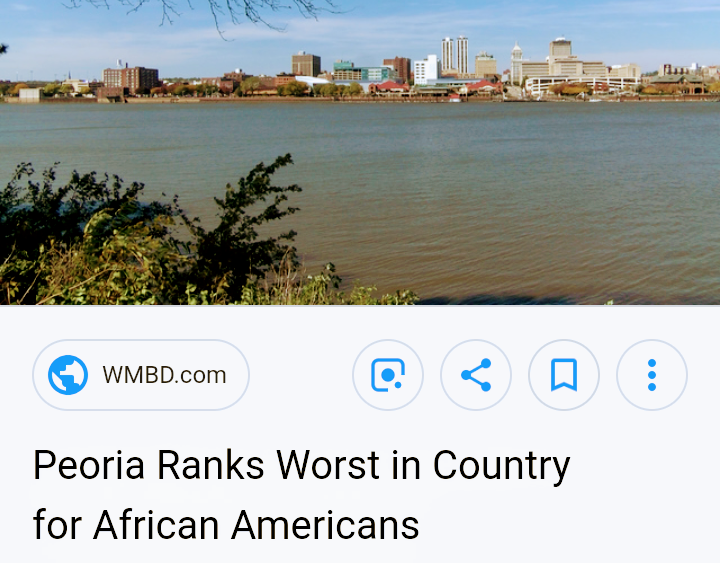 "Something WORSE than what they are use to in Chicago."
"Something WORSE than what they are use to in Chicago."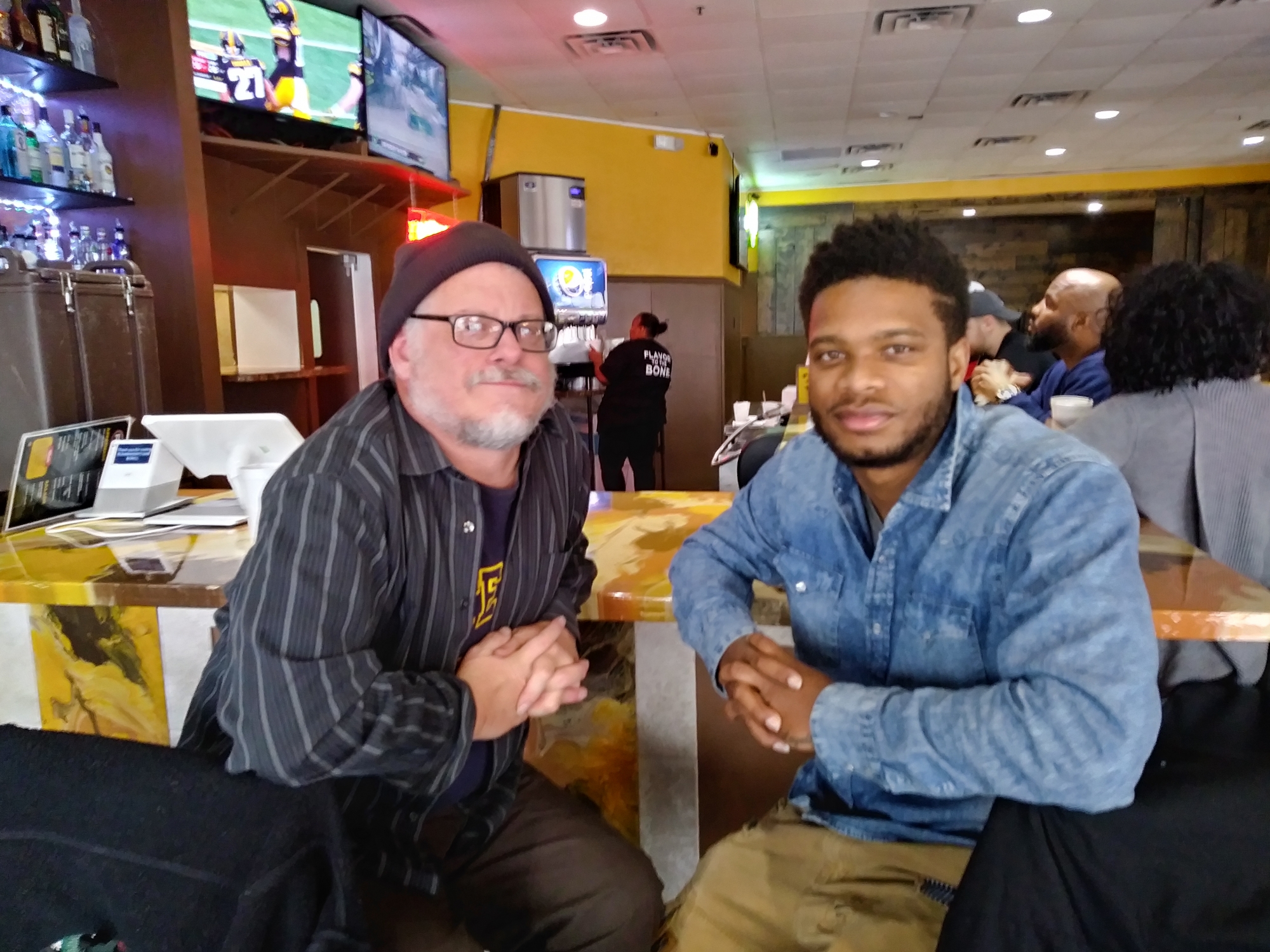 Maushard & Evolon at Rumberger's Wings & More, downtown Peoria.
Maushard & Evolon at Rumberger's Wings & More, downtown Peoria.


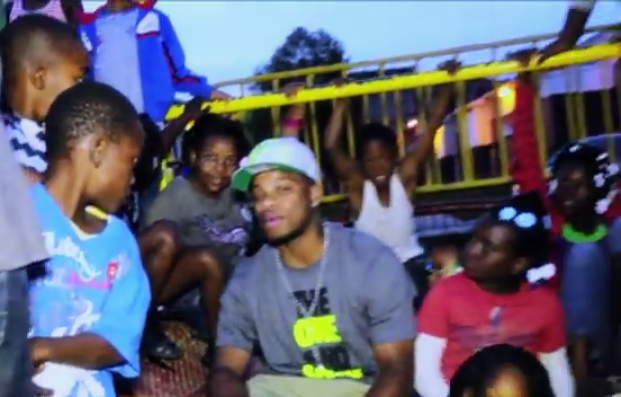 "Home of Richard Pryor. Known for the killin'."
"Home of Richard Pryor. Known for the killin'."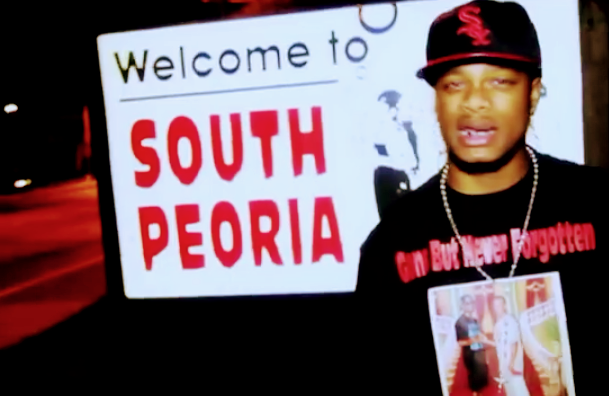 "The smallest big city. The biggest small town."
"The smallest big city. The biggest small town."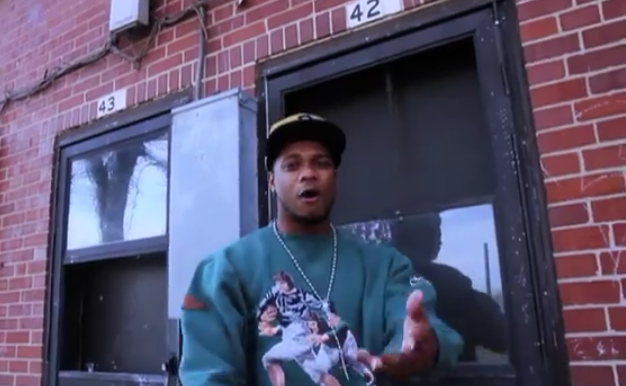 "Where you got two choices. Stand up or fall down."
"Where you got two choices. Stand up or fall down."